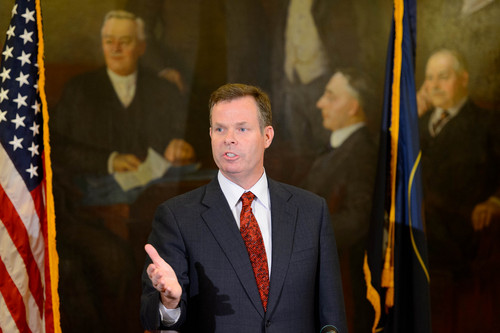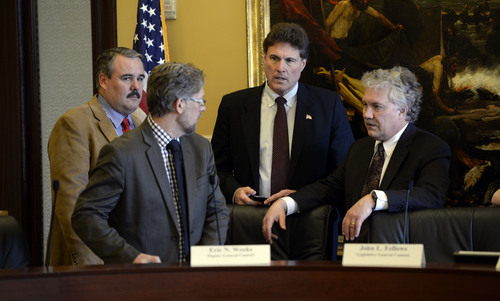This is an archived article that was published on sltrib.com in 2014, and information in the article may be outdated. It is provided only for personal research purposes and may not be reprinted.
The Utah House committee working to finalize a report on its investigation of former Attorney General John Swallow continues to receive information, with some 400 additional emails recovered from Swallow's home computer provided to the panel last week.
The documents show Swallow's direct knowledge of the efforts by the payday-lending industry to drive former Rep. Brad Daw, R-Orem, from office, said legislative counsel John Fellows.
Evidence also reflects Swallow's involvement in a network of nonprofits and political action committees used to hide $450,000 in contributions from the payday-lending industry because they might be deemed politically damaging.
"They found further evidence," Fellows said, "corroborating some of the facts and information that were disclosed to the committee in the December meeting."
The bipartisan panel spent more than $100,000 to recover the documents from Swallow's home computer, which the former Republican attorney general said had failed early last year.
Fellows said the 400 new emails — and another 1,300 the committee received earlier and turned over to criminal prosecutors — are being worked into the committee's final report.
Rep. Jim Dunnigan, R-Taylorsville, chairman of the House investigative committee, said he hoped to have the panel approve the final report Friday, but the additional information means it likely won't be available until next week.
Dunnigan said he plans to have a committee meeting Tuesday, when members can vote to approve the report. The panel then plans to present the final copy — the culmination of the nearly $4 million probe — on the House floor Wednesday morning.
Dunnigan said the draft report is about 200 pages long with more than 3,700 pages of exhibits. It will be put online for the public once it is presented to the House.
"We hope to share the information as soon as we can," Dunnigan said. "It's just the gymnastics of getting it on the Web."
The House voted in July to launch its investigation into alleged misconduct by Swallow. The committee hired special counsel, issued a number of subpoenas and spent nearly an estimated $1 million recovering lost data before Swallow announced his resignation in November.
In December, investigators spent two days spelling out pay-to-play arrangements in which Swallow did special favors for big donors and political backers. They revealed a shadow fundraising network that funneled more than $450,000 from payday lenders to a series of nonprofits, spending money to attack opponents of Swallow and the industry.
And, perhaps most significantly, investigators pointed to what they viewed as a pattern in which Swallow lost or destroyed data and fabricated other documents to try to justify a consulting deal he had with a prominent payday lender and cover his interaction with a St. George businessman. That businessman, Jeremy Johnson, was under federal investigation at the time and has since been charged with scores of felony fraud charges.
Swallow had data lost or deleted from his work laptop and desktop computers, his home computer and his cellphone. He lost a campaign iPad and a backup hard drive that had information from his work computer. He also lost an untold number of emails and calendar entries.
Two prosecutors — Salt Lake County District Attorney Sim Gill, a Democrat, and Davis County Attorney Troy Rawlings, a Republican — are still conducting a criminal investigation of Swallow, his predecessor, Mark Shurtleff, and others. Assisted by FBI agents, their probe already has produced felony charges against Shurtleff confidant Tim Lawson.
Twitter: @RobertGehrke







